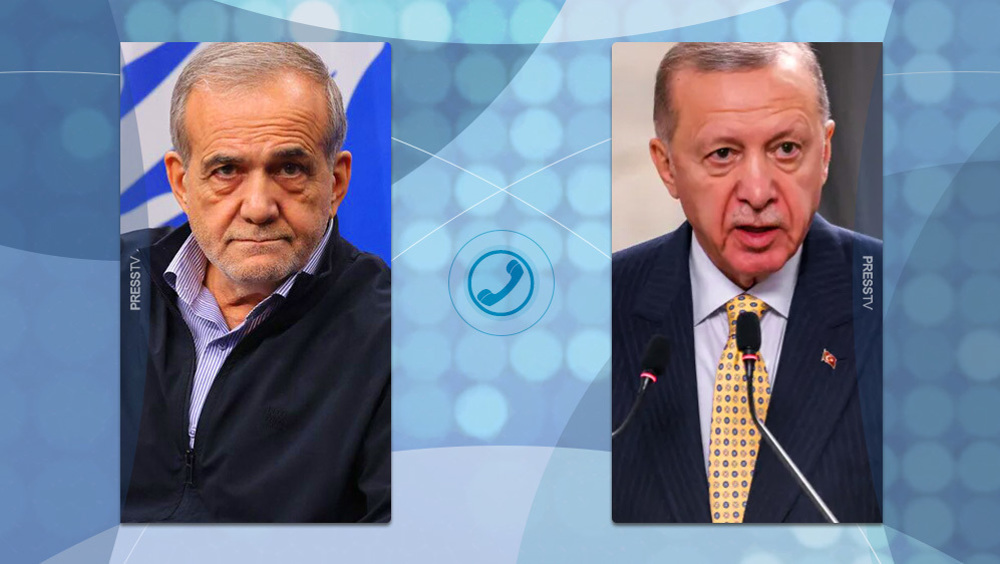Russia ‘ready to cooperate’ to sell Turkey Su-57 fighter jets: Official
The chief executive of Russia’s state-owned hi-tech industrial development conglomerate, Rostec Corporation, says his country is “ready to cooperate” to sell Turkey Sukhoi Su-57 fighter jets in case Ankara is excluded from the F-35 fighter jet program with the United States.
“These fifth-generation Russian fighter jets [Su-57] have outstanding qualities, and show promise for export,” Sergey Chemezov told Turkey’s official Anadolu news agency on Thursday.
He noted that Moscow would “gladly evaluate” any Turkish suggestions for the localization or transfer of technologies of Su-57 warplanes as well as advanced S-400 air defense missile systems.
“We are ready to support Turkey’s desire to develop its own defense industry,” Chemezov said.
The Russian official went on to say that Turkey, irrespective of US-led pressure regarding the S-400 deal, is holding a very direct and consistent position concerning implementation of all provisions of the contract.
“We signed the contract for the S-400s in 2017, and before the end of this year, we plan to conclude all deliveries,” Chemezov commented.
He also said Russia welcomes Turkey’s participation in the development of S-500 missile system.
“The S-500s are currently under development and will be a Russian state-of-the-art air defense system without equal throughout the world,” Chemezov said, stressing that both countries had the capacity to contribute to such a project.
The United States announced on April 1 that it would be suspending all “deliveries and activities” related to Turkey’s procurement of F-35 stealth fighter jets over Ankara’s plans to purchase the S-400s.
On April 24, Turkey Foreign Minister Mevlut Cavusoglu said his country will look elsewhere for an alternative to American F-35 fighter jets if Washington blocks the delivery of its advanced stealth warplanes to Ankara.
“We are already partners in the F-35 manufacturing program, we participate in this project, we have paid the necessary amount. There are currently no problems with this,” Cavusoglu said.
“But in the worst case scenario, we will have to satisfy our need in another place, where the best technologies will be offered,” he added.
Moscow and Ankara finalized an agreement on the delivery of the S-400 in December 2017.
Back in April 2018, Turkish President Recep Tayyip Erdogan and his Russian counterpart Vladimir Putin said in Ankara that they had agreed to expedite the delivery of the S-400. At the time, it was said that the delivery could be made between late 2019 and early 2020.
A number of NATO member states have criticized Turkey for its planned purchase of the S-400, arguing the missile batteries are not compatible with those of the military alliance.
They also argue that the purchase could jeopardize Ankara’s acquisition of F-35 fighter jets and possibly result in US sanctions.
The S-400 is an advanced Russian missile system designed to detect, track, and destroy planes, drones, or missiles as far as 402 kilometers away. It has previously been sold only to China and India.
Ankara is striving to boost its air defense, particularly after Washington decided in 2015 to withdraw its Patriot surface-to-air missile system from Turkish border with Syria, a move that weakened Turkey’s air defense.
Before gravitating towards Russia, the Turkish military reportedly walked out of a $3.4-billion contract for a similar Chinese system. The withdrawal took place under purported pressure from Washington.
Ankara’s ties with its Western allies in NATO have been strained over a range of other issues, including Washington’s support for Kurdish militants in Syria as well as the US government’s refusal to hand over Fethullah Gulen, a powerful opposition figure living in the US blamed for a coup attempt against Ankara in July 2016.
Kata’ib Hezbollah asks fighters to prepare for 'war' in support of Iran
Israeli warplanes conduct new aggressions across southern Lebanon
Democrats threaten govt. shutdown after second ICE killing in Minneapolis
MSF to disclose limited list for Gaza staff after Israel revoked its aid licenses
VIDEO | India defies Western push at UN Rights Council on Iran
Cuba's president observes drills, vows high cost for any US aggression
Iran dismisses Nazi-style propaganda on riot death toll
Israel kills more civilians in Gaza amid relentless ceasefire violations






















 This makes it easy to access the Press TV website
This makes it easy to access the Press TV website